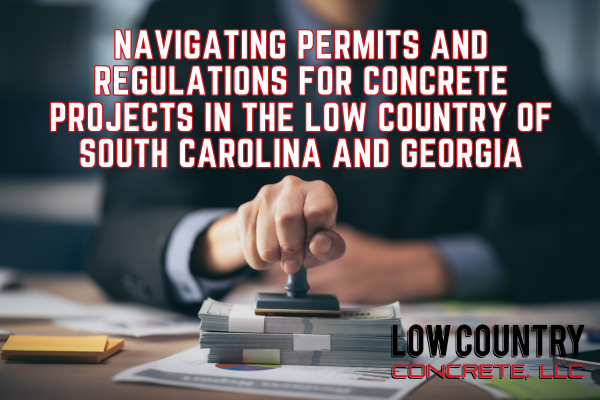Embarking on a concrete construction project in the Low Country of South Carolina and Georgia requires a clear understanding of local permits, regulations, and codes. Whether you’re planning a new driveway, patio, foundation, or other concrete work, navigating these requirements is essential to ensure compliance and a smooth construction process. Low Country Concrete is here to provide you with the necessary insights to navigate the regulatory landscape in this unique region.
Understanding Local Regulations
The Low Country, encompassing coastal areas of South Carolina and Georgia, presents specific regulatory challenges due to environmental concerns, historical preservation efforts, and varying local ordinances. Before starting your project, it’s crucial to research and understand the specific regulations that apply to your location.
Types of Concrete Projects Requiring Permits
In our region, common concrete projects that typically require permits include:
- Driveways and Sidewalks: New installations, expansions, or replacements.
- Patios and Outdoor Living Spaces: Particularly if they involve structural changes or additions.
- Foundations: Whether for new constructions or additions to existing structures.
- Retaining Walls: Especially those exceeding certain height limits.
- Structural Repairs: Significant repairs or alterations to existing concrete structures.
- Decorative Concrete Work: Depending on the scope and impact on property aesthetics.
Identifying which projects necessitate permits is the first step in ensuring compliance with local regulations.
Steps to Obtain Permits
- Contact Local Authorities: Begin by contacting the building department or planning office in your specific city or county. They can provide information on permit requirements, application forms, and fees.
- Prepare Documentation: Gather necessary documents such as detailed project plans, site drawings, and any required engineering reports. These documents demonstrate compliance with building codes and zoning regulations.
- Submit Application: Complete the permit application accurately and include all required documentation. Pay any applicable fees at the time of submission.
- Review Process: The building department will review your application to ensure compliance with local ordinances, building codes, and environmental regulations. This process may take several days to a few weeks depending on the complexity of your project and workload of the department.
- Receive Permit: Upon approval, you will receive the necessary permits to proceed with your concrete project. Ensure that permits are displayed prominently at the job site as required.
Building Codes and Regulations
Building codes in the Low Country focus on structural integrity, safety, and environmental considerations unique to coastal areas. Key aspects of building codes and regulations may include:
- Foundation Requirements: Specifications for footings, slabs, and structural supports, considering factors like soil conditions and potential for flooding.
- Materials and Methods: Standards for concrete mixtures, reinforcement, and construction techniques that account for coastal weather conditions and environmental impact.
- Accessibility: Compliance with ADA requirements for accessible routes and surfaces, ensuring inclusivity in project design.
Zoning and Land Use Regulations
Zoning ordinances in the Low Country dictate how properties can be used and developed within specific areas. These regulations may affect aspects such as setbacks from property lines, maximum building heights, and aesthetic considerations. Reviewing zoning regulations ensures that your concrete project aligns with local land use policies.
Professional Assistance and DIY Considerations
While DIY projects are an option for some homeowners, larger or more complex concrete projects often require professional expertise. Low Country Concrete is familiar with local regulations and can streamline the permit process and ensure compliance with building codes and zoning laws. We also have the skills and equipment necessary to execute concrete work safely and effectively in coastal environments.
Challenges and Considerations
We’ll help you navigate challenges, including:
- Environmental Compliance: Addressing concerns related to stormwater management, erosion control, and protection of sensitive habitats.
- Historical Preservation: Respecting historical architecture and cultural heritage in areas with significant historical value.
- Community and Neighborhood Concerns: Addressing objections from neighbors regarding property aesthetics, noise, and construction impacts.
Low Country Concrete: Your Partner In The Permitting Process
Your next concrete project requires careful planning and adherence to local requirements. By understanding the importance of permits, familiarizing yourself with building codes and zoning regulations specific to coastal areas, and seeking professional assistance from Low Country Concrete, you can ensure a successful and compliant construction process. Compliance not only avoids legal issues but also contributes to the safety, durability, and environmental sustainability of your concrete project. With proper preparation and understanding, you can navigate the regulatory landscape confidently and enjoy the benefits of a well-executed concrete project in this picturesque coastal region.


Recent Comments